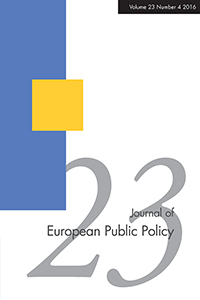By Hebel, Kai, and Tobias Lenz

This article analyses the relationship between identity and foreign policy in the European Union (EU) – a linkage that we term the ‘identity/policy nexus’. Our principal argument is that the collective identity of the EU exerts a systematic yet contingent influence on its foreign policy. We develop this argument in three steps. First, we observe that much of the existing literature under-specifies how identity translates into foreign policy, resulting in a problematic tendency to essentialize the nexus. To remedy this weakness, we propose an inductive approach that empirically traces the political processes constituting the nexus. Second, to facilitate such analysis, we introduce a novel heuristic framework. The framework delineates two translation processes – identity construction and identity operationalization – both of which are conditioned by the political dynamics of the supranational space in which the processes unfold. Finally, we apply this framework to the time period between 1962 and 1975. We observe that the operation of the nexus was characterized by a high degree of contingency. This finding, we suggest, validates an inductive approach to the study of the nexus.

Published:
2016